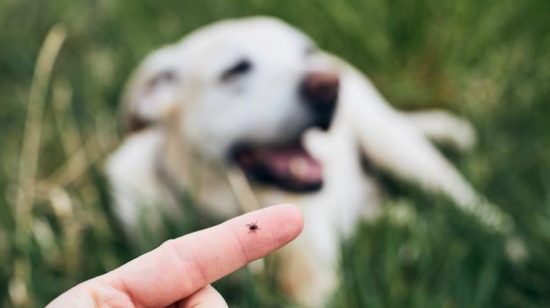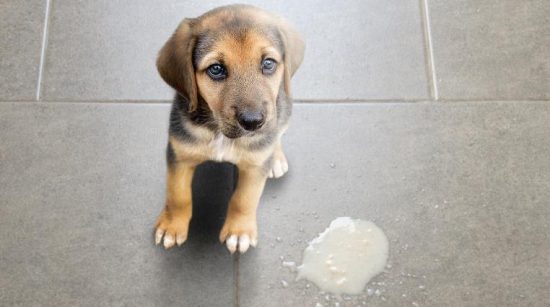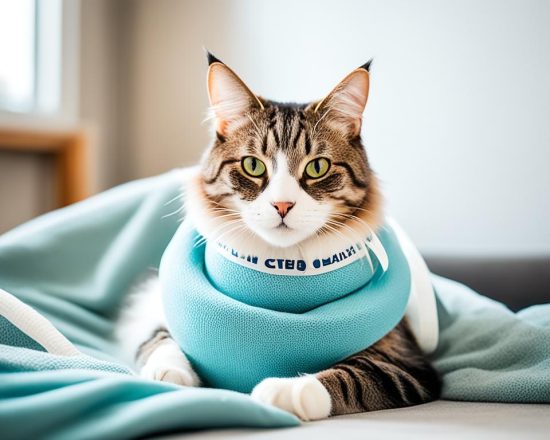Why Is My Cat Peeing on My Clothes?
Struggling with your cat’s unwelcome behavior? Discover the reasons behind why is my cat peying on my clothes and find effective solutions.
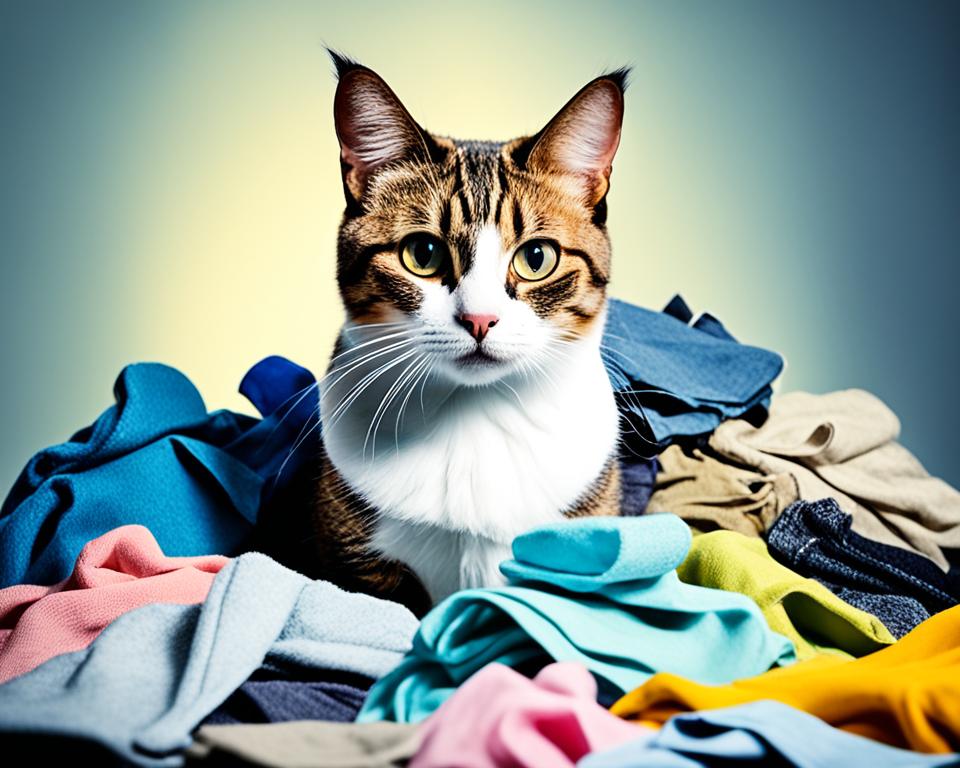
Did you know that urinary tract infections (UTIs) are a prevalent health problem in cats, impacting felines of all ages and genders by causing them to urinate in unwanted places?
If you’ve noticed your cat urinating on your clothes, it can be both frustrating and perplexing. Despite their typically clean nature, cats sometimes exhibit cat behavior problems like this, indicating possible medical or behavioral concerns. Understanding the root cause of your cat’s urination issues is essential for resolving the problem effectively and ensuring a healthy environment for both you and your furry friend.
Ignoring these incidences of inappropriate urination can lead to severe medical complications or entrenched habits. Whether you’re dealing with a medical issue such as Feline Lower Urinary Tract Disease (FLUTD) or behavioral factors like stress and anxiety, decoding the reasons behind this behavior is the first step in finding a solution.
So, how do you stop your cat from peeing on your clothes? Investigating the cause of the problem is key. In the sections that follow, we’ll delve into potential medical and behavioral reasons, common litter box issues, and practical solutions to help your furry companion return to their normal, hygienic habits.
Medical Reasons Behind Your Cat Peeing on Clothes

Medical issues are often at the core of why your cat might be peeing on clothes. These health problems can cause significant discomfort during urination, prompting your feline friend to seek alternative locations for relief. Identifying and addressing these medical causes promptly with the help of a veterinarian can prevent the behavior from becoming habitual and ensure your cat’s wellbeing.
Urinary Tract Infection (UTI)
Urinary tract infections are common in cats and can lead to inappropriate urination. A cat suffering from a urinary tract infection may feel a sudden and intense urge to eliminate, often choosing soft surfaces like clothes for comfort. Diagnosis typically involves a urinalysis and a veterinary examination. Prompt treatment can alleviate your cat’s discomfort and resolve the peeing issue.
Feline Lower Urinary Tract Disease (FLUTD)
Feline Lower Urinary Tract Disease (FLUTD) encompasses various urinary tract issues, including bladder stones and bladder inflammation. Symptoms like frequent urination, straining, and blood in the urine are common. These issues can lead to your cat avoiding the litter box and peeing on clothes instead. Veterinary care for FLUTD may include dietary changes, medication, and increased fluid intake to maintain urinary health.
Kidney Disease and Diabetes
Kidney disease and diabetes are other significant medical conditions that can result in frequent urination and, consequently, accidents outside the litter box. Cats with kidney disease often produce large amounts of diluted urine, while diabetes increases urine production due to higher blood sugar levels. Both conditions require a veterinarian’s diagnosis through blood tests and urine analysis. Treatment might involve medications, special diets, and regular monitoring to manage these chronic conditions effectively.
Being aware of these medical reasons and seeking prompt veterinary assistance can make a substantial difference in your cat’s quality of life and help to restore their proper bathroom habits.
Behavioral Causes for Cats Urinating on Clothes
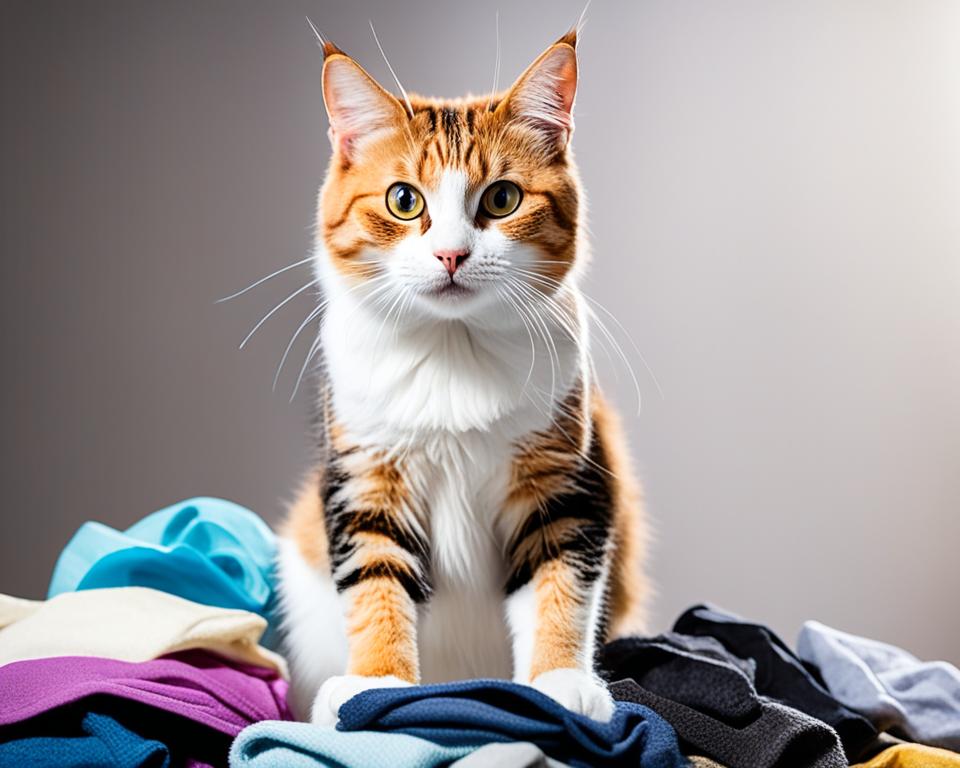
Understanding the behavioral reasons behind your cat’s inappropriate urination habits is crucial. These issues often stem from your cat’s natural instincts, environmental stressors, and specific preferences. Identifying these causes can pave the way for effective behavior modification for cats.
Territorial Marking
Territorial marking is a common behavior among cats feeling threatened or insecure. When cats sense intrusion from new pets, new family members, or even other cats outside the home, they might resort to marking their territory with urine. This cat marking behavior is particularly prevalent in unneutered males but can occur in any cat facing stress and anxiety. Ensuring your cat feels secure in its environment is essential to mitigating this instinctive behavior.
Stress and Anxiety
Stress and anxiety are significant factors leading to inappropriate urination. Changes in routine, moving homes, or the arrival of new pets or babies can trigger anxious behaviors in cats. To alleviate stress and reduce urination incidents, consider providing safe, quiet areas for your cat to retreat and using calming pheromone diffusers near litter boxes. These steps can help create a more stress-free environment for your feline. Addressing stress and anxiety promptly can prevent these behavioral issues from becoming ingrained habits.
Preference for Certain Textures
Sometimes, cats may develop a preference for the texture of clothes over their litter boxes. If the litter box does not meet their preferences regarding cleanliness, texture, or scent, they are likely to choose alternative spots to urinate. It’s recommended to have at least one litter box per cat, plus one additional box, and to place them on every floor of your house. Regularly cleaning the litter box and experimenting with different types of litter can cater to your cat’s preferences and reduce the likelihood of inappropriate urination. Implementing effective behavior modification for cats can ensure a harmonious living environment.
Common Litter Box Issues That Lead to Inappropriate Urination
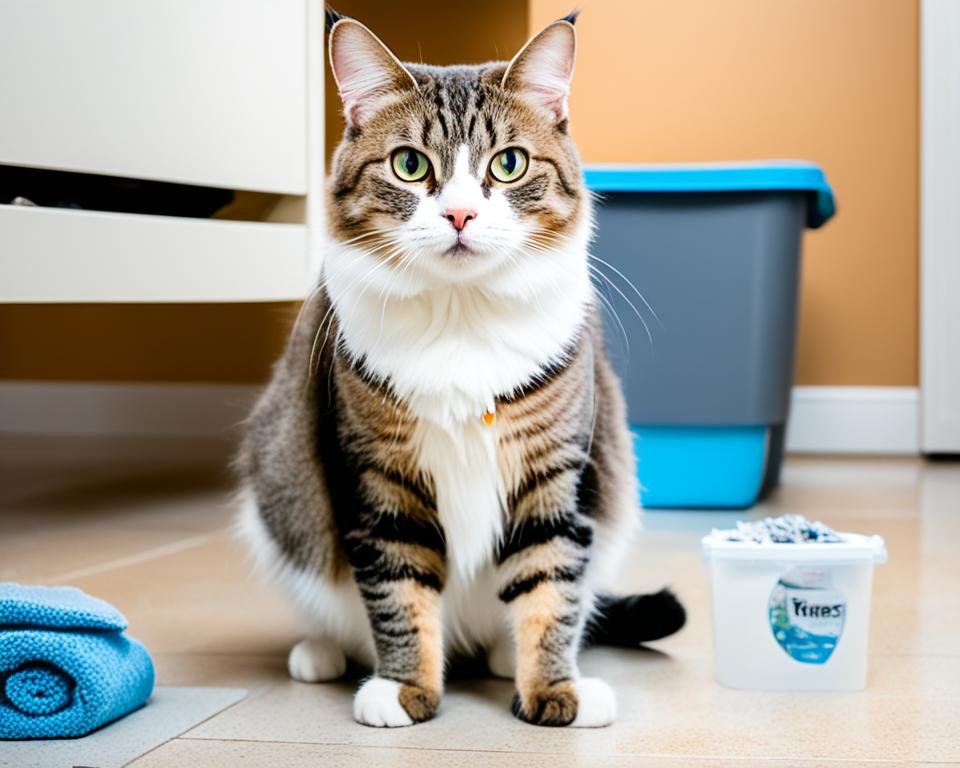
Cats are particular about their litter boxes, and common issues related to the placement, type, size, and cleanliness of these boxes can lead to inappropriate urination. Ensuring that your cat’s litter box meets their specific needs is crucial for maintaining their bathroom habits.
Litter Box Location and Number
One of the key components of effective cat litter box training is the strategic placement of the boxes. A dirty litter box located in a high-traffic area can deter your cat from using it. Similarly, if you have several cats, providing one more litter box than the number of cats in the household is essential. In homes with more than seven cats, it’s likely that one or more cats will spray due to territorial stress or frustration. Cats also prefer to eliminate in quiet, accessible locations, making the right placement and quantity critical.
Litter Type and Box Size
The type of litter and size of the box matter significantly to your cat. A mismatch in litter type and box size can make a cat avoid using their designated bathroom area. Hooded litter boxes may be uncomfortable for some cats, while others may prefer a specific type of litter. Also, medical issues like arthritis can make it challenging for some cats to use smaller or deep boxes, necessitating an appropriate size and type to cater to your cat’s preferences and physical conditions.
Litter Box Cleanliness
Maintaining impeccable litter box cleanliness is non-negotiable. A dirty litter box can be a significant factor leading to inappropriate urination. Cleaning the litter box at least once or twice daily can address this issue efficiently. Products containing ammonia or vinegar should be avoided as they can irritate cats. Utilizing enzymatic cleaners can help in thoroughly cleaning previously soiled areas, thus preventing future incidents. This routine maintenance of clean litter boxes helps set your cat up for success and contributes to their overall wellbeing.
How to Address the Issue of Your Cat Peeing on Your Clothes
Understanding how to stop a cat from peeing on clothes begins with identifying and addressing the root causes, whether medical or behavioral. Make sure to consult your vet to rule out any health issues like urinary tract problems or kidney diseases that could be driving your cat’s behavior. Monitoring your cat’s health is easier with PrettyLitter, which offers 20% off plus a free toy when you use code PRETTYBLOG at checkout. PrettyLitter changes color to alert you to potential health issues early on.
Once medical issues are excluded, focus on the environment. Cats are highly sensitive to changes and stress, which can trigger inappropriate urination. To minimize stress and make your cat feel secure, maintain a clean litter box as cats prefer a hygienic environment. The general rule of thumb is one litter box per cat, cleaned daily and thoroughly each month. You might need to experiment with different box placements and designs to find what suits your cat best.
Cat urine smell removal is another crucial aspect. Use enzyme-based cleaners to effectively break down uric acid found in cat urine, converting it into carbon dioxide and ammonia. Avoid heat when washing clothes to prevent setting the urine smell; instead, add white vinegar to the washing machine to neutralize odors. Repeat the cleaning process as necessary to ensure complete odor removal. Additionally, placing treats near past urination spots can discourage repeat offenses. This comprehensive approach will help in maintaining a healthy and happy environment, addressing all potential reasons for your cat peeing outside of the litter box.
FAQs
Why is my cat all of a sudden peeing on my dirty clothes?
Sudden inappropriate urination in cats can stem from medical issues, stress, anxiety, territorial marking, or dissatisfaction with litter box conditions. Consult your veterinarian to diagnose any health problems and consider possible environmental or behavioral triggers.
How do I stop my cat from peeing on my clothes?
To stop your cat from peeing on your clothes, first rule out any medical conditions with a veterinarian. Then, address any behavioral triggers such as stress or anxiety, improve litter box conditions, and consider behavior modification techniques. Consistent cleaning and environmental enrichment can also help.
What medical conditions can cause my cat to pee on my clothes?
Medical conditions such as urinary tract infections, bladder stones, kidney disease, diabetes, and Feline Lower Urinary Tract Disease (FLUTD) can cause discomfort during urination, prompting your cat to seek alternative places to relieve themselves, like your clothes. A veterinarian’s diagnosis is crucial.
What is Feline Lower Urinary Tract Disease (FLUTD)?
Feline Lower Urinary Tract Disease (FLUTD) encompasses various conditions affecting a cat’s bladder and urethra. Symptoms include difficulty urinating, frequent urination attempts, and blood in the urine. FLUTD can cause significant discomfort, leading cats to urinate outside the litter box.
Can stress and anxiety cause my cat to pee on clothes?
Yes, stress and anxiety can lead to inappropriate urination in cats. Environmental changes, new pets, or routine disruptions can make cats feel insecure, prompting them to mark territory or seek comfort by urinating on familiar items like clothes. Reducing stress and providing a stable environment can help.
How does territorial marking relate to my cat peeing on clothes?
Territorial marking is an instinctive behavior in cats to assert dominance or cope with perceived threats. If your cat feels their territory is compromised, they may urinate on your clothes to mark their territory. Identifying and mitigating stressors can reduce these markings.
Why might my cat prefer to urinate on fabrics instead of the litter box?
Cats may prefer to urinate on soft textures if they find their litter box unappealing due to location, type of litter, or cleanliness. Fabrics like clothes are soft and may feel more comfortable on their paws compared to an unclean or unsatisfactory litter box.
What can I do about my cat’s litter box issues?
Ensure an adequate number of litter boxes (ideally one per cat plus one extra), place them in quiet and accessible locations, use a preferred type of litter, and maintain cleanliness by scooping daily and washing weekly. These steps help prevent litter box aversion.
How can I remove the smell of cat urine from my clothes?
Immediately treat urine-soaked clothes with enzymatic cleaners designed to break down urine molecules. Wash them with cold water and avoid using ammonia-based products, as they can mimic the smell of urine and encourage repeat urination in the same spot.
When should I seek professional help for my cat’s urination issues?
If you’ve ruled out medical issues and addressed litter box and environmental factors yet your cat continues to urinate inappropriately, consulting a professional cat behaviorist or veterinarian is essential. They can offer specific behavior modification strategies and further investigate potential underlying causes.

